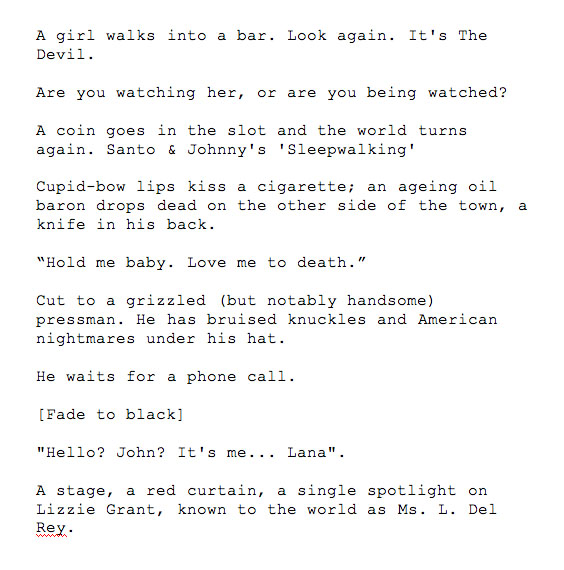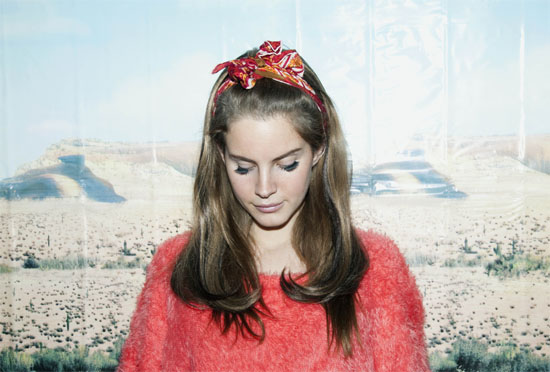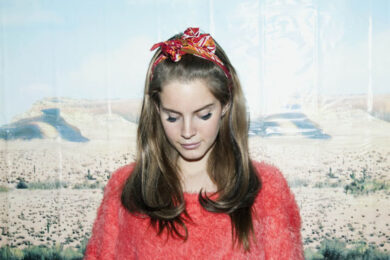All photographs by kind permission of Naomi Shon

She talks like a dairy queen, like Britney Spears, like a cheerleader. 24 years old and exuding the hardy effervescence unique to healthy American girls, there is nothing in Del Rey’s manner that connects the voice at the end of the line to ‘Video Games’, the YouTube smash hit carried by a purring vocal performance so rich you can feel almost feel David Lynch’s velvet carpeting under your fingers.
That is until I hit playback on my telephone’s dictaphone. Slowly all the years of a weary, haunted youth spent in backwoods New York State unravel from under her bubbly facade, like furtive murmurings on the other side of a door. As per the many doomed chanteuses and dead movie idols she invokes in her cinematic music, it seems Del Rey is a good actress. In true Lynch fashion, beneath her white picket-fenced cheer hide the writhing earthworms that plague her heavy heart.
With increasing frequency, naysayers are testing the walls of Del Ray’s persona, in particular questioning exactly who should be credited for her perfectly realised Valley of the Dolls aesthetic. Amidst universal praise for ‘Video Games’, she’s nevertheless faced the incredulity of everyone from high profile bloggers to broadsheet columnists to disgruntled indie stars (Amy Klein of Titus Andronicus threw her oar in), some of whom are convinced she’s a kohl-eyed marketing ploy and as fake as those eyelash extensions. So in a delicious twist of dramatic irony, it’s precisely Del Rey’s persona – the artifice – that forms her only barrier of defence against the media’s worst advances.
Its a lie, however, to tell the truth. Because it seems her story up to now, if largely less glamorous, isn’t so different to that of the Marilyn Monroes or the Judy Garlands, or indeed Lynch’s own tragic starlet in Mulholland Drive. The story goes: smalltown girl moves to the big city, falls into dark waters, becomes forever imprisoned in the house of mirrors that is the media’s oppressive gaze.
Enter frame the Quietus, at hand to shoot the close-up she may or may not be ready for.
Have you always had a dark side, Lana?
Lana Del Rey: When I was younger I felt lonely… In terms of my thought processes. I had the constant feeling that I thought differently to everyone around me. So, I suppose I felt lonely for a home. I didn’t know where I wanted to be, but I knew I wasn’t there yet. I think that this loneliness set a dark undertone for things to come.
Are you a David Lynch fan?
LDR: Yeah. When I was a kid playing in bars in Lake Placid, after every show somebody would come up to me and be like ‘You must be a David Lynch fan!’. At the time I wasn’t up on ‘all things cool’, but I looked into Lynch and quickly became a fan. Although I think the themes he explores are a step further into the extreme than I’m prepared to go.
If you can put it down to one scene, which Lynch moment do you return to most for inspiration when writing? I envisage something like the Mulholland Drive theatre sequence, crossed with the home video of a dead Laura Palmer dancing with Donna on the hill.
LDR: Have you ever seen Fire Walk With Me and the scenes where Laura Palmer is in the bar with the lumberjacks, sort of dancing and getting crazy? Well, it’s that frightening sensation of being out of control that really sticks in my mind.
Some of the music in your chosen field of expertise suggests love has more to do with obsession than companionship. For example ‘The End Of The World’ by Skeeter Davis has a creepy What Ever Happened To Baby Jane quality about it. And then there’s your line from ‘Video Games’: ‘It’s you, it’s you, it’s all for you / Everything I do’. Does this idea resonate with you?
LDR: I really love that [Davis] song, actually. And yeah, that idea resonates with me. Growing up I was always prone to obsession, partly because of the way I am, but partly because after feeling so lonely for such a long time, when I found someone or something that I liked, I felt helplessly drawn to it. I suppose that accounts for some of the creepiness in my music.
Like a fatal attraction?
LDR: Yeah. After I was sent away to school when I was 15, I had to start life on my own. So I began looking for that ‘someone’ to hang on to. And if it so happened that I found him, then there have been occasions in the past where I’ve been overtaken by my feelings. But with some of the bad things that come with love, there’s also a lot of good… For example that connection… which I struggle to have with most people. So although there’s a dark side to love, there’s also something really hopeful.
You moved to New York City at age 18. Were you at all inspired by New York’s noirish undertones?
LDR: Yeah. The way I experienced New York, for a long time after I moved, was alone and at night, walking the streets. I mean, there are thousands of streets in New York and I know them all. I’d go down to the tip of Manhattan, or even down to Coney Island, then travel all the way back up. Because I come from a place that, geographically, isn’t that stimulating. But New York’s architecture alone is enough to inspire a whole album. In fact, that’s what happened at first – my early stuff was mostly just interpretations of landscapes.
Do you feel yourself change when ‘in character’?
LDR: ‘Lana’ and ‘Lizzy’ are the same person. I wish I could escape into some alter-ego, just so I could feel more comfortable onstage, but I feel the same as Lana as I do Lizzy.
How was it working with David Kahne [The Strokes, Regina Spector, Paul McCartney] on your debut? He has a background in replicating bygone eras.
LDR: It was validating when David asked to work with me, only a day after he got my demo. He has known as a producer with a lot integrity and who had an interest in making music that wasn’t just pop.
In terms of instruction, what was Kahne’s input?
LDR: He had a lot of things he wanted done. For example, he was interested in a more traditional vocal style and I wasn’t. He’s also a real scientist, so he had a very particular plan. The album ended up somewhere in between what he wanted and what I wanted.
There’s a theory that the archetype you portray plays to male sexual fantasies?
LDR: In the video for ‘Video Games’, I was trying to look smart and well turned-out, rather than ‘sexy’. Of course I wanted to look good, but ‘smart’ was the primary focus.
What inspired ‘Video Games’?
LDR: A boy. I think we came together because we were both outsiders. It was perfect. But I think with that contentment also comes sadness. There was something heavenly about that life – we’d go to work and he’d play his video games – but also it was maybe too regular. At the time I was becoming disillusioned with being a singer and was very happy to settle with a boyfriend who I loved, but in the end we both lost sight of our dreams. Maybe there’s something not-so-special about domestic life.
A popular American blog recently published a supposed exposé on you, with accusations of inauthenticity. Do you feel like you’ve had your eyes opened? [At the beginning of the interview tQ apologises in advance for ‘going on a bit’. Lizzy/Lana’s telling response is ‘Better a bore than an assassin…’]
LDR: I dunno. If I say anything they’ll just publish something like [speaks like an anchorman reading the headlines] ‘Lana Del Ray Gets Her Feelings Hurt!’. It just seemed that with that one article, they were particularly cruel. Not in a playground/indie/mean way, but in a personal vendetta sort of way. They really made it their mission to destroy me. I’m not a confrontational person, so if that’s going to be my life from here on, I’d honestly rather not sing or have a career.
In an interview with Pitchfork you said that people have offered you opportunities in exchange for sleeping with them. Is this true? At the corporate level?
LDR: [Laughs, then becomes tongue-tied]
I mean… uh… uh… I mean things get a little crazy, I guess.
Um… There are some situations when you kind of know.
… I mean, it’s sort of a loaded question.
It’s common knowledge that The Pretenders’ Chrissie Hynde was, by her own admittance, hopelessly drawn to the bad boys – damaged and dark men. Would that be the case with Lizzy?
LDR: Yeah, in the past that has been the case. I think with so-called ‘creative’ people, their particular strain of genius can cause the pendulum to swing too far – into self-destruction and what you could call ‘madness’, which is something I can relate to. So, yes, I was once attracted to that. But that was then. Now I’m looking for something more simple.
You also told Pitchfork that God has saved your life a million times, which strikes me as in opposition to your music. Because, in films based in small town America, religion is frequently a patriarchal, repressive and evil presence, with the archetype you portray acting as a force in subverting it.
LDR: I think there’s a division of organised religion similar to what you’ve described. But where I’m concerned, my understanding of God has come from my own personal experiences… because I was in trouble so many times in New York that if you were me, you would believe in God too. When things get bad enough, your only resort is to lie in bed and start praying. I dunno about congregating once a week in a church and all that, but when I heard there is a divine power you can call on, I did. I suppose my approach to religion is like my approach to music – I take what I want and leave the rest.
What kind of ‘trouble’?
LDR: Any and all. When I was in New York I had nowhere to live, and I was trying to find a way to be a musician… Just trying to survive, which is fucking hard by the way. So I got myself into a lot of situations I didn’t plan on. [Pauses] I think what I was going for was something beautiful, but I kinda got myself into trouble along the way. Sorry, that’s pretty vague.
But you live in London now?
LDR: No, not yet. I’ve been in London for most of the last two years, but I’ll book three months there then go home to New York for three weeks. However, when I’m not working I go see my friends in Glasgow, so I spend my time there when I want to have fun. I’m in Glasgow right now.
Any encounters with [notorious angry drink enjoyed especially in Celtic territories] Buckfast? I like the image of you stabbing someone in a car park.
LDR: [Laughs] No, I’m a good girl. I leave the drinking to the boys these days.
Do you feel that the ‘Femme Fatale’ archetype still has the power to tap into ‘male sexual anxieties’ or challenge a patriarchal society?
LDR: If I’m honest, no. Not as much as it used to. In the 50s it was a new premise, a new form of female power. I think that these days, plain old intellectualism is a more powerful force than the idea of the femme fatale.
Why is it, do you feel, that so much of ‘Golden Age’ pop placed love, and laterally eroticism, in such close proximity with notions of death? In particular the music of Roy Orbison.
LDR: I suppose because, sometimes, love feels like a life or death situation. I mean, losing true love is pretty much as bad as it gets, other than actually dying or losing good health. Most people know that. Most people can relate. As Davis says, it’s like the end of the world.




